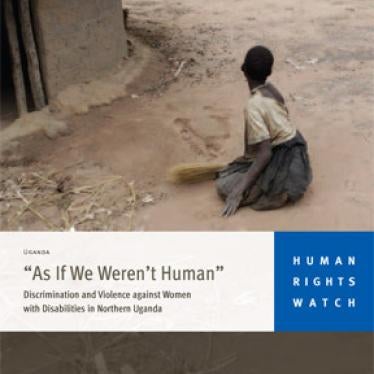As told by Shantha Rau Barriga
Edna seemed shy, rounding her shoulders protectively over her baby. She was breastfeeding, and I could see the burn scars on the top of her head. Despite her initial self-consciousness, she told us her story, starting with the fire that led to her blindness.
She had lived in a rural village that she said had been attacked by the Lord's Resistance Army, a notorious rebel group. The rebels burned down her house with 12 people inside, she said. She was one of the few to survive, but her burns left her blind and partially deaf.
Despite the hardships she endured, Edna still smiled, emanating personal warmth. As she told me how she supported her children by begging, I thought of my own baby, a bit younger than Edna's, living in very different circumstances in the United States.
An estimated 20 percent of Ugandans have disabilities. This figure is probably higher in the war-torn north, where government troops fought the LRA. The government forced people into squalid camps, which cut off their access to health care and led to an increase in disabling diseases like polio. Many people also lost the use of limbs due to landmines or gunshot wounds.
In Uganda's primarily agrarian society, women with disabilities are often labeled "useless" by family and neighbors. They often can't fetch water or work in the fields. Many don't go to school. I spoke with one deaf woman whose children were avoided by neighbor kids because they didn't want to catch ‘deafness.'
As Ugandans in the north struggle to reclaim their lives, women with disabilities are being left behind.
These women tend to be isolated and shunned, hidden in their communities. No one drops by to see how they are, to offer to help them in the fields, or to take them to the doctor. It's as if they're invisible.
I was shocked to find out how many of the women with disabilities I spoke with had been abandoned by their men. Other men would use them for sex. Some women said people in their village taunted men whose partners had a disability.
More than one-third of the 64 women and girls with disabilities we interviewed said that they had been sexually abused, beaten, or raped. Their disabilities made them vulnerable to attack - they couldn't physically defend themselves, and they were isolated from their communities. People view them as weak and stupid, an easy target. Such assaults increase their risk of HIV infection, as does the abandonment by their sexual partners.
But the voices of people with disabilities in Uganda are growing stronger. The government has ratified a major international treaty on disability rights and is actively consulting people with disabilities on issues that affect them. The key is to ensure that the government takes women with disabilities into consideration while planning Uganda's post-war reconstruction.
After we released our report, the UN Population Fund agreed to do more training about disabilities with their staff working on violence against women. The agency also pledged to compile data on the number of women with disabilities who experience violence in Uganda. This is an essential step - without knowing this number, it's impossible to know whether programs meant to help women with disabilities are reaching them.
Human Rights Watch is supporting local disability groups as they develop an anti-discrimination campaign and a project on violence against women with disabilities. We are regularly in contact with the state minister on disability and elderly affairs and UN agencies.
Additionally, the committee monitoring the UN Convention on the Elimination of All Forms of Discrimination against Women (CEDAW) raised concerns with Uganda's government about how women with disabilities are faring, drawing even more international attention to the issue.
Edna continued telling us her story. The father of her first child, now 6, was killed by the LRA. Her baby's father, ashamed of being associated with a blind woman, abandoned her when she became pregnant. When she went to a clinic for prenatal care, Edna learned that she was HIV-positive. When I asked her how she coped, she said her 6-year-old has to lead her to the hospital to collect her antiretroviral drugs.
After our conversation, Edna walked us out of her home. I couldn't believe how much she had dealt with - the brutality of the conflict, her loss of sight, living with HIV, being a single mom, living in poverty. Despite it all, she had found a way to take care of herself and her family with such grace. It's people like Edna who really inspire me to do this work. I just hope that our research and advocacy will lead to changes that will empower the millions of women like Edna.


